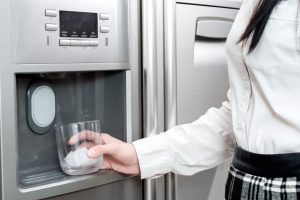Summer Water Damage
The absolute worst time for water damage problems to occur is when you’re away from home. Nothing can compare to the absolute horror of coming home to summer water damage after a great vacation. Unfortunately, this happens more often than homeowners think. The second most common insurance claim is water damage to the home. Whether the damage is from the ice maker, the washing machine, air conditioner, water heater or dishwasher, the aftermath is always devastating. Keep your nerves in check while you go on that well-deserved vacation this summer. Here are a few tips to help protect your home from summer water damage.
Summer Water Damage from Air Conditioner Condensation Leaks: Air conditioner condensation leaks can be caused by cracks/holes in the overflow drain pan, dirty/clogged air filters, or a plugged up condensate line. Carefully inspect the overflow pan. It’s best to replace it altogether but small holes and cracks can easily be patched up with epoxy glue. Clogged filters should be changed. Inspect the filter every month. Dirty filters cause ice to form on the air conditioner’s evaporator coils. When the ice melts, water drips. A plugged condensate line floods the overflow pan. You may use a vacuum cleaner to clear this up or simply have your unit serviced regularly to avoid costly damage down the line.
Washing Machine Summer Water Damage: The average washing machine water damage claim is at least $5,000. Washing machines have different ways of causing water damage. The most common cause is a hose leak. More than 50% of washing machine water damage can be traced to a faulty supply hose. Check the connection between the washing machine and the wall. Inspect the hose for aging, cracks, and hairline breaks. If your washing machine is at least five years old, chances are, you might need to replace your connection with a steel braided one.
 Refrigerator Ice Maker Water Damage: Refrigerator ice maker water damage doesn’t happen overnight. Often times, a small crack in the plastic water line causes a small leak. Over several weeks or months, this little leak drips collects beneath the refrigerator, damaging your floor and walls. This means that over time, you will need to have your drywall or flooring replaced because mold is a serious consequence if left untreated. To prevent your ice maker from wreaking havoc, check your water line regularly and replace with a steel braided one.
Refrigerator Ice Maker Water Damage: Refrigerator ice maker water damage doesn’t happen overnight. Often times, a small crack in the plastic water line causes a small leak. Over several weeks or months, this little leak drips collects beneath the refrigerator, damaging your floor and walls. This means that over time, you will need to have your drywall or flooring replaced because mold is a serious consequence if left untreated. To prevent your ice maker from wreaking havoc, check your water line regularly and replace with a steel braided one.
Dishwasher Water Damage: Dishwasher water damage can get overwhelming! Common causes of dishwasher leaks include using the wrong dishwashing soap, a broken door, a defective dishwasher tub, and worn gaskets. Since the appliance is built-in to fit cabinets, summer water damage could destroy tile, laminate, wood, electrical wiring, carpets and even drywalls. To prevent this, keep a close eye on your dishwasher. If you notice leaks, turn off your dishwasher immediately and mop up visible water. Pull the unit out from the cabinet and call a professional to inspect your unit.
Water Heater Leaks: Water heater leaks can be caused by several reasons – from a corroded tank to loose/damaged valves, to condensation. If, upon inspection, water sprays from the pipes, turn off the shut-off valve (usually located above the water heater) immediately. Rotate the handle clockwise or pull the lever to 90 degrees, If you can’t locate it, shut off the house’s water supply.
To prevent further water damage:
- Shut off the Water while on Vacation – Nip potential problems in the bud. Locate your water’s main supply valve. If you aren’t sure, have someone show it to you and everyone in the house. In an emergency, shutting off the water supply prevents further flooding.
- Check Your Water Bill – It May Indicate a Leak – High water bills are strong indicators of exceeds outflow. Keep a record of statements and check for trends. If you haven’t installed an appliance that uses water or if your lifestyle hasn’t changed in the last few months, water leaks may be the culprit.




Follow Us!